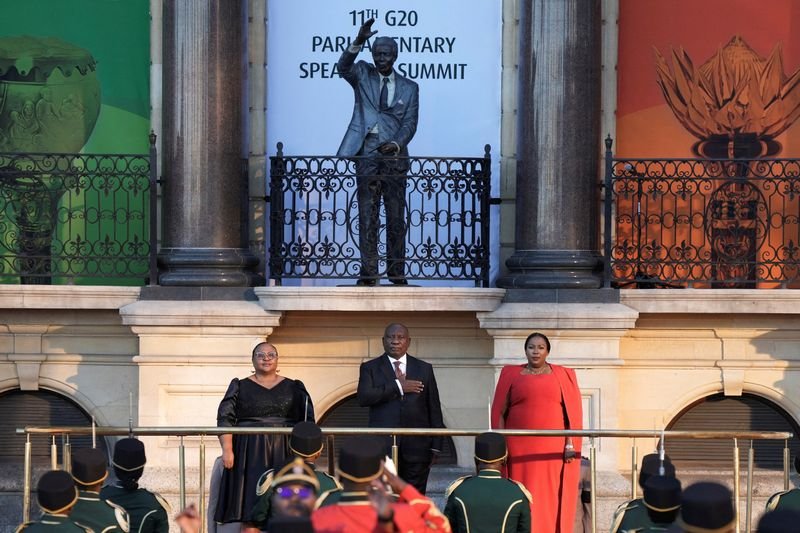The stark divide that South Africa's land act seeks to bridge
Published by Global Banking & Finance Review®
Posted on February 9, 2025
6 min readLast updated: January 26, 2026

Published by Global Banking & Finance Review®
Posted on February 9, 2025
6 min readLast updated: January 26, 2026

South Africa's land act aims to address land ownership inequality, allowing expropriation without compensation, reigniting racial tensions.
By Tim Cocks
FATENG TSE NTSHO, South Africa (Reuters) - The township of Fateng Tse Ntsho houses some 7,000 Black South Africans, its huddle of corrugated metal roofs surrounded on all sides by vast tracts of mostly empty grassland owned by prosperous white farmers.
The contrast illustrates the gaping land inequalities that persist more than three decades after the end of white minority rule - and which an expropriation act President Cyril Ramaphosa signed last month partly seeks to redress.
That law, which allows the government to confiscate land - in rare cases without compensation - has reignited racial tensions that have dogged Africa's southernmost tip ever since European settlers began arriving nearly four centuries ago.
For nervous owners, it is an assault on property rights, a view shared by U.S. President Donald Trump, who last week wrongly stated that land had already been seized under it when he threatened to cut aid to South Africa. On Saturday, the White House went so far as to offer white farmers resettlement in the United States and "humanitarian relief."
But the expanses of white-owned land in Free State province, dotted with tiny Black settlements like Fateng, illustrate why proponents deem the act necessary.
Fateng's local councillor, Malefetsani Mokoena, 51, spends his days mediating disputes between landowners and Black rural folk who live among them. Tall and wiry, he is usually decked out in the red uniform of his party, the Economic Freedom Fighters (EFF), which wants to nationalise the country's gold and platinum mines and seize land from white farmers.
"Sometimes the white farmers don't trust me," he told Reuters in the township's three-room brick municipal office. "But when we sit down and negotiate, we can work things out."
One white farmer interviewed by Reuters, Danie Bruwer, confirmed that he and Mokoena were on good terms.
If a farmer has a sheep stolen, Mokoena finds the thief to get it back. A Black herder has his cows impounded for trespassing on white-owned land; Mokoena negotiates their release.
And, as with the 15 other farms in his caseload, if what Mokoena calls "farm dwellers" - squatters, legally speaking - face eviction or restrictions on their rights to graze animals, he finds them legal representation.
'THIS IS OUR HOME'
The mostly white-owned farms around here are among the nearly 26 million hectares - about three quarters of privately-owned land - still in the hands of whites, who make up 8% of the population. Only 4% of privately-held land is owned by Blacks who are nearly 80% of South Africa's 60-million population.
On one white-owned farm, Meyerskop, 57-year-old herder Shadrack Maseko surveyed an expanse of hilly pasture stretching almost to the horizon. He complained of how it had been fenced off a decade ago by a new white owner to prevent cattle owned by Black South Africans grazing on it.
Maseko's grandparents had come here in the early 1900s to seek work as farm hands, he told Reuters during a visit with the EFF councilor Mokoena.
The family had been there ever since, he said. His father, who died two years ago, was born here, as was Maseko.
"This is home," he said, and then to illustrate the point: "Even some of our ancestors are buried here."
The farm has changed hands between white farmers several times since Maseko's family has lived there, and buyers had previously been happy for them to stay on and work, he said.
But in the past decade he and 14 other families living on Meyerskop have been in a dispute with the latest white owners over grazing rights for their 30-odd cows, details of which were corroborated by six other residents interviewed by Reuters.
In 2019, farm owners the Fonteintjie Trust and trustee Fourie Scheepers sought a court order to force them to sell most of their cows. It argued the animals were badly degrading the land, according to a copy of the application seen by Reuters.
Maseko said Scheepers had proposed another patch of land - a small area flanked by maize fields that Maseko indicated on a part of the farm - while the new owners moved their own cows to the old space. Maseko said the new patch was too small.
"No comment," Scheepers replied via text message several times, when asked about the case.
'START OF A JOURNEY'
For many Black people, disputes like these reflect a legacy of inequality left by the colonial and apartheid eras, when they were dispossessed of their lands and denied property rights.
In 1913, a Native Land Act gave most farmland to whites, mostly Afrikaners of Dutch descent, leaving just 13% to Blacks. Then in 1950 the Afrikaner National Party passed a law removing 3.5 million Black people from their ancestral lands.
Thirty years of ANC government has created a class of super-rich Black businessmen, but done little for the poor majority.
"The idea (behind the act) is that our freedom was not complete in 1994 because the promise of...economic emancipation was not fulfilled," legal expert Tembeka Ngcukaitobi said.
He noted that the act requires 17 steps before land can be expropriated. But for Kellie Kriel, CEO of Afriforum, a pressure group that represents the interests of the white Afrikaner community, that is not enough of a safeguard.
"The act creates a valid fear that it opens the road to ... land grabs," he said, adding farmers worry that the act's guidelines could be abused.
Some white farmers, like Danie Bruwer, are more sanguine.
"It's an emotional thing for the farmers ... but it's not so bad. Zero compensation is a last resort," he said on his 1,000-hectare farm about 30 km (20 miles) from Fateng.A bigger problem, he said, is that without better support for farmers - hit hard by climate change, rising costs, corruption and stock theft - the act may not achieve much.
For Ngcukaitobi, that is not the point.
"It's the start ... not the end of the journey," he said. "A reminder that what (people) fought for, what they went to prison for, what they died for, was not in vain."
(Additonal Reporting by Catherine Schenck in Johannesburg; Reporting by Tim Cocks, Editing by William Maclean)
The expropriation act allows the government to confiscate land, in rare cases without compensation, to address historical land inequalities.
The act has reignited racial tensions in South Africa, highlighting the ongoing disparities in land ownership between Black South Africans and white landowners.
The Native Land Act of 1913 allocated most farmland to whites, leaving only 13% for Blacks, creating a legacy of inequality that persists today.
White farmers express concerns that the act could lead to land grabs and that its guidelines may be abused, creating fear over property rights.
For many Black South Africans, the land act represents a step towards economic emancipation and rectifying the injustices of the past, although challenges remain.
Explore more articles in the Headlines category


